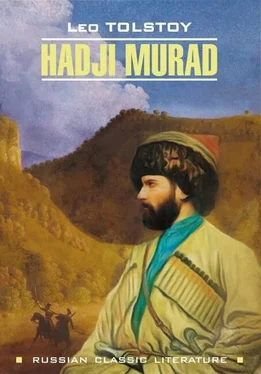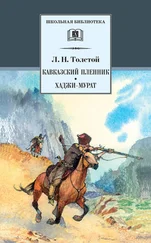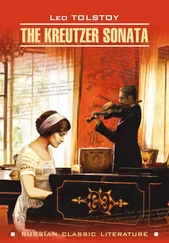“It shall be done,” replied Chernyshov; and after a short pause he straightened the tuft on his forehead and returned to the Caucasian report.
“What do you command me to write in reply to Prince Vorontsov’s dispatch?”
“To keep firmly to my system of destroying the dwellings and food supplies in Chechnya and to harass them by raids.” answered Nicholas.
“And what are your Majesty’s commands with reference to Hadji Murad?” asked Chernyshov.
“Well, Vorontsov writes that he wants to make use of him in the Caucasus.”
“Is it not dangerous?” said Chernyshov, avoiding Nicholas’s gaze. “Prince Vorontsov is too confiding, I am afraid.”
“And you – what do you think?” asked Nicholas sharply, detecting Chernyshov’s intention of presenting Vorontsov’s decision in an unfavorable light.
“Well, I should have thought it would be safer to deport him to Central Russia.”
“You would have thought!” said Nicholas ironically. “But I don’t think so, and agree with Vorontsov. Write to him accordingly.”
“It shall be done,” said Chernyshov, rising and bowing himself out.
Dolgoruky also bowed himself out, having during the whole audience only uttered a few words (in reply to a question from Nicholas) about the movement of the army.
After Chernyshov, Nicholas received Bibikov, General-Governor of the Western Provinces. Having expressed his approval of the measures taken by Bibikov against the mutinous peasants who did not wish to accept the orthodox Faith, he ordered him to have all those who did not submit tried by court-martial. that was equivalent to sentencing them to run the gauntlet. He also ordered the editor of a newspaper to be sent to serve in the ranks of the army for publishing information about the transfer of several thousand State peasants to the imperial estates.
“I do this because I consider it necessary,” said Nicholas, “and I will not allow it to be discussed.”
Bibikov saw the cruelty of the order concerning the Uniate peasants and the injustice of transferring State peasants (the only free peasants in Russia in those days) to the Crown, which meant making them serfs of the Imperial family. But it was impossible to express dissent. Not to agree with Nicholas’s decisions would have meant the loss of that brilliant position which it had cost Bibikov forty years to attain and which he now enjoyed;
and he therefore submissively bowed his dark head (already touched with grey) to indicate his submission and his readiness to fulfil the cruel, insensate, and dishonest supreme will.
Having dismissed Bibikov, Nicholas stretched himself, with a sense of duty well fulfilled, glanced at the clock, and went to get ready to go out. Having put on a uniform with epaulets, orders, and a ribbon, he went out into the reception hall where more than a hundred persons – men in uniforms and women in elegant low-necked dresses, all standing in the places assigned to them – awaited his arrival with agitation.
He came out to them with a lifeless look in his eyes, his chest expanded, his stomach bulging out above and below its bandages, and feeling everybody’s gaze tremulously and obsequiously fixed upon him he assumed an even more triumphant air. When his eyes met those of people he knew, remembering who was who, he stopped and addressed a few words to them sometimes in Russian and sometimes in French, and transfixing them with his cold glassy eye listened to what they said.
Having received all the New year congratulations he passed on to church, where God, through His servants the priests, greeted and praised Nicholas just as worldly people did; and weary as he was of these greetings and praises Nicholas duly accepted them. All this was as it should be, because the welfare and happiness of the whole world depended on him, and wearied though he was he would still not refuse the universe his assistance.
When at the end of the service the magnificently arrayed deacon, his long hair crimped and carefully combed, began the chant “Many Years,” which was heartily caught up by the splendid choir, Nicholas looked round and noticed Nelidova, with her fine shoulders, standing by a window, and he decided the comparison with yesterday’s girl in her favor.
After Mass he went to the empress and spent a few minutes in the bosom of his family, joking with the children and his wife. then passing through the Hermitage, he visited the Minister of the Court, Volkonski, and among other things ordered him to pay out of a special fund a yearly pension to the mother of yesterday’s girl. From there he went for his customary drive.
Dinner that day was served in the Pompeian Hall. Besides the younger sons of Nicholas and Michael there were also invited Baron Lieven, Count Rzhevski, Dolgoruky, the Prussian Ambassador, and the King of Prussia’s aide-de-camp.
While waiting for the appearance of the Emperor and Empress an interesting conversation took place between Baron Lieven and the Prussian Ambassador concerning the disquieting news from Poland.
“La Pologne et le Caucases, ce sont les deux cautères de la Russie,” said Lieven. “Il nous faut cent mille hommes à peu près, dans chacun de ces deux pays.” 25 25 La Pologne et le Caucases, ce sont les deux cautères de la Russie … Il nous faut cent mille hommes à peu près, dans chacun de ces deux pays. – Poland and the Caucasus are the two nonhealing wounds of Russia. We need about a hundred thousand men in each of these countries.
The Ambassador expressed a fictitious surprise that it should be so.
“Vous dites, la Pologne 26 26 Vous dites, la Pologne – You say, Poland
– ” began the Ambassador.
“Oh, oui, c’était un coup de maître de Metternich de nous en avoir laissé l’embarras… 27 27 Oh, oui, c’était un coup de maître de Metternich de nous en avoir laissé l’embarras… – Oh, yes, it was a master stroke of Metternich to have left us embarrassed…
”
At this point the Empress, with her trembling head and fixed smile, entered followed by Nicholas.
At dinner Nicholas spoke of Hadji Murad’s surrender and said that the war in the Caucasus must now soon come to an end in consequence of the measures he was taking to limit the scope of the mountaineers by felling their forests and by his system of erecting a series of small forts.
The Ambassador, having exchanged a rapid glance with the aide-de-camp – to whom he had only that morning spoken about Nicholas’s unfortunate weakness for considering himself a great strategist – warmly praised this plan which once more demonstrated Nicholas’s great strategic ability.
After dinner Nicholas drove to the ballet where hundreds of women marched round in tights and scanty clothing. One of the specially attracted him, and he had the German ballet-master sent for and gave orders that a diamond ring should be presented to her.
The next day when Chernyshov came with his report, Nicholas again confirmed his order to Vorontsov – that now that Hadji Murad had surrendered, the Chechens should be more actively harassed than ever and the cordon round them tightened.
Chernyshov wrote in that sense to Vorontsov; and another courier, overdriving more horses and bruising the faces of more drivers, galloped to Tiflis.
In obedience to this command of Nicholas a raid was immediately made in Chechnya that same month, January 1852.
The detachment ordered for the raid consisted of four infantry battalions, two companies of Cossacks, and eight guns. The column marched along the road; and on both sides of it in a continuous line, now mounting, now descending, marched Fagers in high boots, sheepskin coats, and tall caps, with rifles on their shoulders and cartridges in their belts.
Читать дальше
Конец ознакомительного отрывка
Купить книгу












